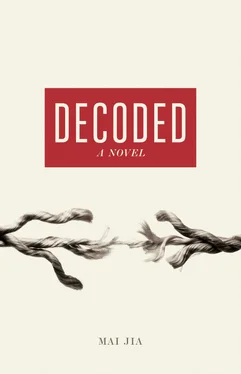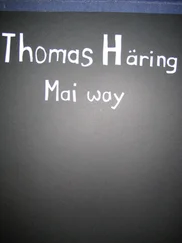Mai Jia - Decoded
Здесь есть возможность читать онлайн «Mai Jia - Decoded» весь текст электронной книги совершенно бесплатно (целиком полную версию без сокращений). В некоторых случаях можно слушать аудио, скачать через торрент в формате fb2 и присутствует краткое содержание. Год выпуска: 2014, Издательство: Allen Lane, Жанр: Современная проза, на английском языке. Описание произведения, (предисловие) а так же отзывы посетителей доступны на портале библиотеки ЛибКат.
- Название:Decoded
- Автор:
- Издательство:Allen Lane
- Жанр:
- Год:2014
- ISBN:нет данных
- Рейтинг книги:3 / 5. Голосов: 1
-
Избранное:Добавить в избранное
- Отзывы:
-
Ваша оценка:
- 60
- 1
- 2
- 3
- 4
- 5
Decoded: краткое содержание, описание и аннотация
Предлагаем к чтению аннотацию, описание, краткое содержание или предисловие (зависит от того, что написал сам автор книги «Decoded»). Если вы не нашли необходимую информацию о книге — напишите в комментариях, мы постараемся отыскать её.
Decoded — читать онлайн бесплатно полную книгу (весь текст) целиком
Ниже представлен текст книги, разбитый по страницам. Система сохранения места последней прочитанной страницы, позволяет с удобством читать онлайн бесплатно книгу «Decoded», без необходимости каждый раз заново искать на чём Вы остановились. Поставьте закладку, и сможете в любой момент перейти на страницу, на которой закончили чтение.
Интервал:
Закладка:
My little sister died during the summer holidays, when she was just seventeen.
My mother and I didn’t even know of Jinzhen’s existence until after she was dead. Daddy had him hidden in the house of Mr Cheng, the headmaster of a primary school near the West Gate. We didn’t have much to do with Mr Cheng, so even though Daddy was hoping to keep this all a secret from us, he didn’t bother to specifically warn him not to mention it to us. One day, Mr Cheng came to the house. I don’t know where he had heard that my sister had died, but he came to pay a visit of condolence. My father and I happened to be away from home that day, so only my mother was there to greet him and as they talked, Daddy’s secret came out. When he came back, Mummy asked him what was going on, and he told her everything he knew about all the misfortunes this boy had already suffered in his short life, his remarkable intelligence, and the old foreign gentleman’s request. Perhaps it was because Mummy had been so deeply affected by my sister’s death that she just burst into tears when she heard about his unhappiness. She said to Daddy: ‘Yinzhi (that was my little sister’s name) has gone and this boy needs a family. Bring him to live here.’
That was how my little brother Zhendi joined us — Zhendi was Jinzhen’s nickname, you see.
My mother and I both called him Zhendi, only Daddy called him Jinzhen. Zhendi called Mother ‘Mummy’, but he called Daddy ‘Professor’ and me ‘Sis’, so everything was kind of topsy-turvy. Of course, if you looked at the family tree, I would be one generation senior to him, so by rights he should have called me ‘Auntie’.
To tell the truth, I didn’t like Zhendi one little bit when he first turned up. He didn’t smile at all and wouldn’t speak to anyone. He moved round the house in absolute silence, like a ghost. He turned out to have all sorts of disgusting habits, like belching while eating. His hygiene was also appalling: he didn’t wash his feet at night and he would just take his shoes off and throw them down by the stairs, filling the dining room and the corridor with a foul stench. We were living in the house that my father had inherited from Grandpa, a kind of Western-style villa. There was a kitchen and dining room on the ground floor and all the bedrooms were upstairs. Every time I came down the stairs from my bedroom for meals, I would see his rotten and stinking old shoes and think about the way that he belched over his food, and I would find myself not really wanting anything to eat at all. Of course the problem with his shoes was sorted out almost immediately: Mummy told him that he ought pay attention to this and make sure that he washed his feet and put on clean socks every day — after that his socks were cleaner than anyone’s. He was a very capable boy: he knew how to cook, wash his clothes, build a fire out of coal-dust briquettes; he even knew how to sew — in fact he was much better at that kind of thing than I was. Of course, this was all to do with the way that he had been brought up: he had learned how to do all sorts of things. The belching and farting turned out to be much more difficult habits to break him of. Habits can be broken eventually, but in this case it turned out that he had very serious stomach problems, which were also the reason why he was so thin. Daddy told me that his stomach problems were the results of drinking the pearl-blossom tea that Mr Auslander was so fond of day in and day out: that kind of thing was all very well for an old man, but how could it possibly be considered suitable for a growing child! To tell the truth, once we found out about his stomach problems, he ate more medicine than food in our house. He could only eat one little bowl of rice per meal, less than a cat, and even so after just a mouthful or two he would start belching.
One day, Zhendi forgot to lock the door of the lavatory and I walked in, not realizing that it was already occupied. That really wasn’t acceptable. As far as I was concerned, that was the last straw and now I wanted him out of our house. I told Mummy and Daddy that I couldn’t stand it any longer and I wanted him to start boarding at school. I told them that even though he was a relative, that was no reason for him to be living in our home and that lots of other boys lived as boarders at the school. Daddy didn’t say a word — he let Mummy do the talking. Mummy said that it wouldn’t be right to make him leave when he had only just arrived; she said that once term had started, then it might be all right for him to become a boarder.
Daddy then chipped in and said, ‘Okay, once term has started he can stay at school as a boarder.’
Mummy said, ‘We will go and fetch him so that he can spend every weekend here, because he ought to feel that this is still his home.’ Daddy agreed to that. So everything was decided.
However, that is not at all what happened in the end. . [To be continued]
One evening, towards the end of the summer holidays, Master Rong happened to mention at the dinner table something that she had read in the newspapers earlier that day: the previous summer many parts of the country had suffered one of the worst droughts since records began, with the result that in some cities there were more beggars than there were troops. Her mother sighed and said that the previous year had been a double leap year — those years always saw terrible natural disasters. In the final analysis it was always the peasants that suffered the most. Jinzhen did not often open his mouth and so Mrs Lillie always did her best to bring him into the conversation. It was for this reason that she made a point of asking him if he knew what a double leap year was. When he shook his head, Mrs Lillie explained that it came about when a leap year in the solar calendar coincided with one in the lunar calendar; when the two leap years came together. Seeing that he didn’t really understand what she was talking about, Mrs Lillie asked him, ‘Do you know what a leap year is?’
He shook his head again, without making a sound. He was that sort of person: if it was possible to express something by any other means, he would not open his mouth. Immediately Mrs Lillie began to explain to him what a leap year was and how it was dealt with in first the solar calendar and then the lunar calendar, and so on and so forth. When she had finished, he just stared at Young Lillie as if he had been pole-axed, waiting for him to confirm what his wife had just said.Young Lillie said, ‘Exactly. That is how it works.’
‘You mean my calculations were wrong?’ Jinzhen went bright red in the face and looked as if he was about to burst into tears.
‘Your calculations?’ Young Lillie did not know what he was talking about.
‘Daddy’s age — I thought that every year was 365 days long.’
‘That is not quite right. . ’ Before Young Lillie had finished speaking, Jinzhen broke down into floods of tears.
It proved impossible to console him. Whatever people said to him to try and cheer him up, it did not make the blindest bit of difference. In the end Young Lillie had simply had enough and angrily thumped his fist down on the dining table, shouting at him to control himself. Although he did stop crying at that point, it was clear that he was still terribly upset. He was holding onto his thighs, digging his nails in, as if his life depended on it. Young Lillie ordered him to keep his hands above the table. Afterwards, he spoke to him very sternly, though he was clearly intending his words to console the boy. He said, ‘What are you making that kind of racket for? I still haven’t finished speaking. When I have, then you can see if you still want to cry.’
He continued, ‘When I said that you were wrong just now, I was speaking theoretically — the fact is that you ignored the existence of leap years. On the other hand if you look at it from the point of view of mathematics, it would be impossible to say that you were wrong, because there are acceptable errors in any calculation.
Читать дальшеИнтервал:
Закладка:
Похожие книги на «Decoded»
Представляем Вашему вниманию похожие книги на «Decoded» списком для выбора. Мы отобрали схожую по названию и смыслу литературу в надежде предоставить читателям больше вариантов отыскать новые, интересные, ещё непрочитанные произведения.
Обсуждение, отзывы о книге «Decoded» и просто собственные мнения читателей. Оставьте ваши комментарии, напишите, что Вы думаете о произведении, его смысле или главных героях. Укажите что конкретно понравилось, а что нет, и почему Вы так считаете.












